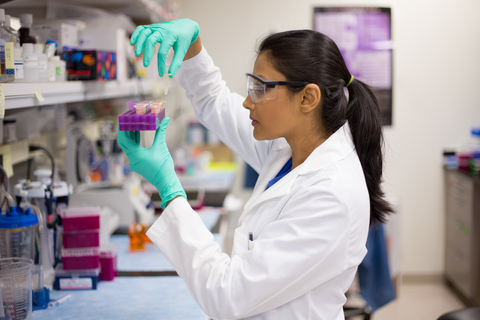Indoor Biotechnologies develops coronavirus T cell test

Cardiff based Indoor Biotechnologies has been awarded almost £50,000 in funding from Innovate UK to develop a Covid-19 test using T cells.
Identifying people who have already been infected with the virus and become immune could have huge benefits for enabling society to safely return to normality.
Since the symptoms of Covid-19 can vary from person to person, and some people display no symptoms at all, reliable testing methods for prior infection and subsequent immunity are vital.
One way of determining whether someone has been infected with the virus is by looking for specific antibodies in blood samples. Numerous antibody tests exist, but doubts remain about their reliability in determining whether a person has gained immunity.
Long-term protection against viruses comes not only from antibodies, but also from cells of the immune system including T cells, which play a critical role in controlling and eradicating viral infections.
MediWales reports the new test proposed by Indoor Biotechnologies focusses on T cells rather than antibodies. If successful, the Simple Cellular Immunity Test (SCIT) can identify the presence of T cells that respond to the virus which causes Covid-19 from a single tube of blood.
The BBC reports Indoor Biotechnologies is “hopeful” the test will help in vaccine development.
The company’s trials found some people who had coronavirus but tested negative for antibodies went on to test positive for T cells, meaning more people may have some immunity than previously thought, and for longer.
It is working with Cardiff University’s School of Medicine on the test and is now approaching vaccine developers, pharmaceutical companies and public health bodies with the product.
Dr James Hindley, executive director of Indoor Biotechnologies is leading the T cell project.
He said “A lot of the focus so far as been on antibodies and that’s important because they provide us some memory to our immune system, but T cells are just as important.”
He said the company had been testing hundreds of people who tested positive for coronavirus in the past, with a focus on healthcare workers, to check whether they had developed T cells.
It has also tested people who have never had coronavirus, to ensure its accuracy.
Some T cells create antibodies if a person is exposed to the virus again, while others can fight the virus directly themselves.
James Hindley, whose PhD was in T cells, said “They can live for a long time after the infection and give you that immune response.
“We don’t know with this virus how long they will last, but it might be for many years.
“That’s the basis of vaccination and vaccination development.
“We have found some situations where people have tested negative for antibodies and positive for T cells, but the significance of that we can only really determine with longer-term studies.”
He said currently only a handful of laboratories across the world are equipped to test for T cells, and it is a “laborious” process with a lot of complex machinery.
His test has “stripped back everything to the bare bones” so the test can be performed by any lab with a single vial of blood, with results within twenty four hours.
Currently the focus of the company’s efforts are how the test can help with vaccine development, but James Hindley said it could eventually be rolled out to the public as a more sensitive method of testing for immunity.
He added “It is something the general public could find useful.”
Dr Ian Campbell, executive chair at Innovate UK , said “This will give clinicians an extra tool, in addition to antibody tests, as we seek to develop treatments and vaccines.”
Dr Martin Scurr is a post-doctorate researcher at Cardiff University’s School of Medicine, on secondment as project manager at Indoor Biotechnologies to set up the test.
He said “The aim is to develop a T cell test that can be easily used by labs across the world, enabling mass testing of COVID-19 T cell immunity to be performed.”
Professor Andrew Godkin, also from the School of Medicine, said “We are delighted to be teaming up with Indoor Biotechnologies on this project. Coupled with the range of work being done here at Cardiff University and the University Hospital of Wales, it will help us understand how the immune system sees this virus, and hopefully enable us to understand what a protective immune response looks like.”








